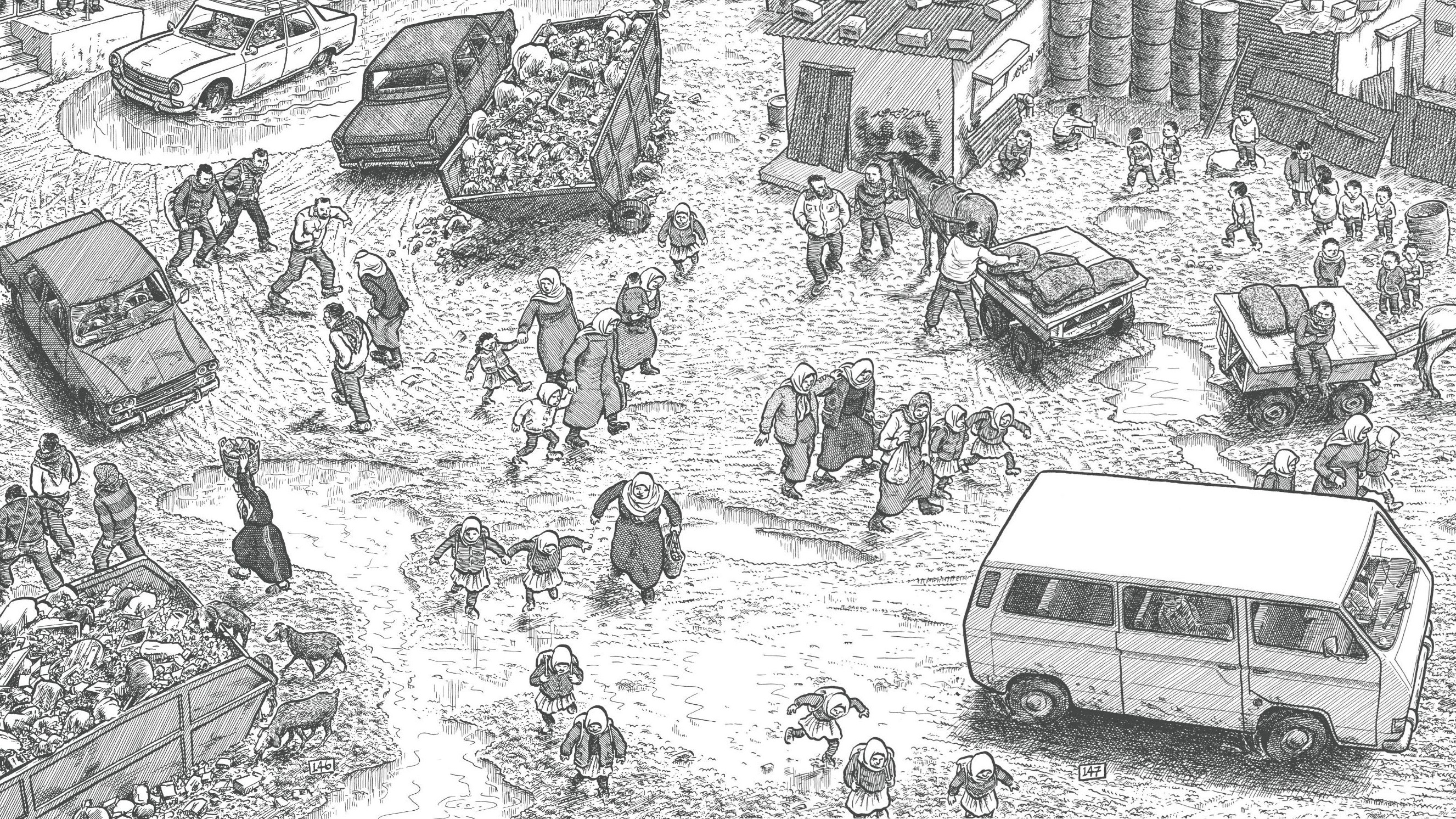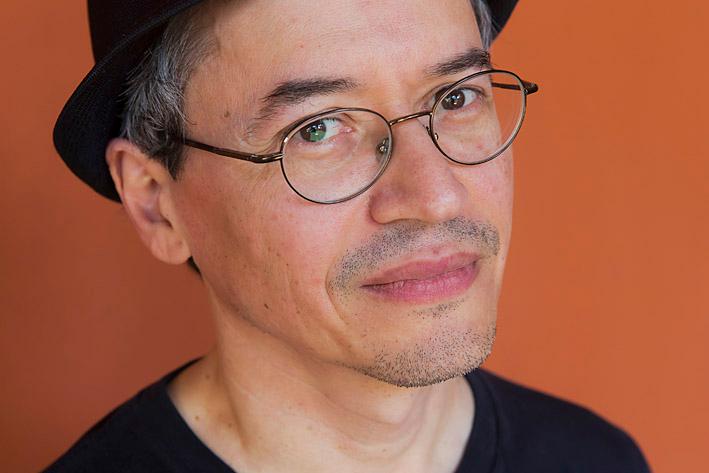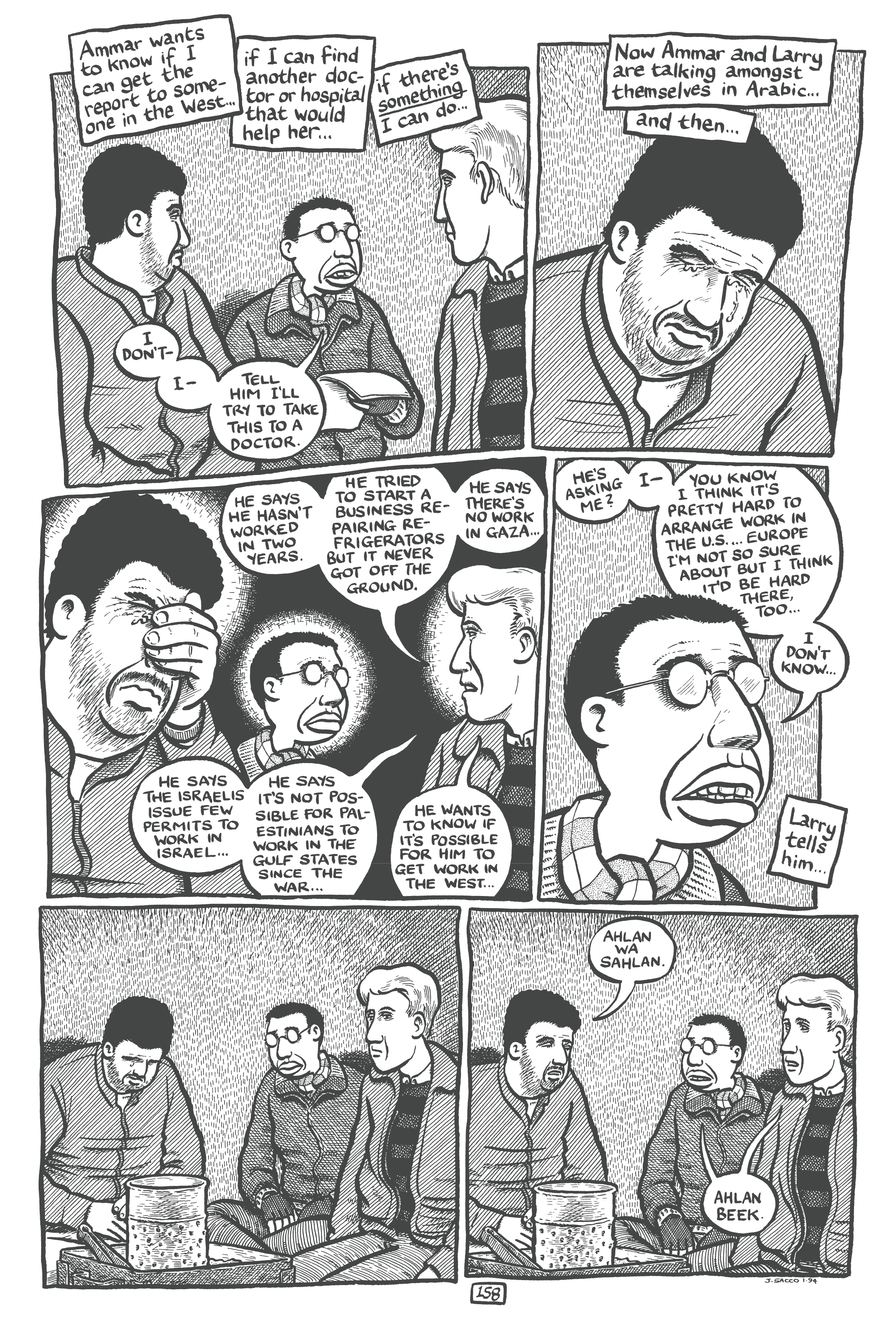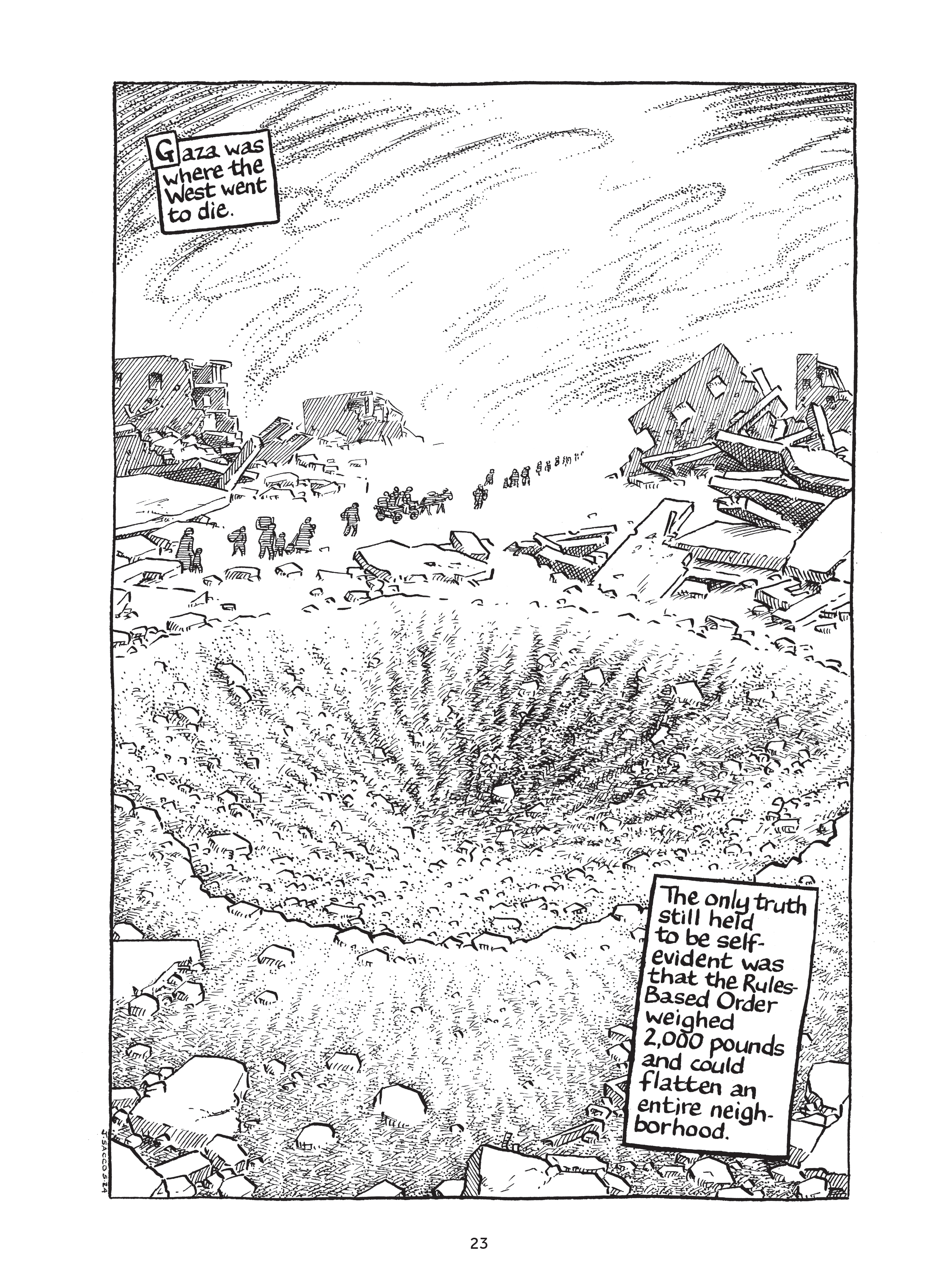"Gaza was where the West went to die"

Maltese American cartoonist Joe Sacco pioneered "comic book journalism" in works like "Palestine" (1996) and "Footnotes in Gaza" (2009), which vividly portrayed Palestinian life under Israeli occupation. Amid recent escalations in Gaza, his work has gained renewed attention, and new editions of "Palestine" have been published by Fantagraphics and Edition Moderne. From January to July 2024 he wrote the regular column "The War on Gaza" for The Comics Journal.
Qantara: When you were creating "Palestine" in the early 1990s, did you imagine it would remain relevant decades later? What gives it such lasting resonance?
Joe Sacco: No, I didn’t expect it. Unfortunately, much of what I depicted in the book still exists today, though now in a far more brutal form: home demolitions, destruction of olive trees, land expropriation, the incarceration of young Palestinian men and settler attacks.
Today, the violence has intensified dramatically. The level of brutalisation is almost incomprehensible, and people can see echoes of the past in today’s events. History is significant because it reminds us that these issues didn’t suddenly emerge on 7 October. Conflict didn’t start then; it has roots going back to before 1948. The book shows, in part, how things were already festering back then.
What are the advantages and flaws of comic journalism in your view?
The weakness is that doing it properly takes a long time. It takes years to create a book. The advantage is that comics pull people in. We naturally respond to visual media like films, documentaries, and photos, so comics are an accessible way to engage readers.
Comics can also act as a filter. I find it hard to watch violent images; I don’t want to see documentaries showing severe pain or death. With comics, there’s some distance because it’s a drawing, allowing violence to be depicted in a way that would be unbearable in a documentary film of the same events. Drawing violent scenes is still hard for me, and they aren’t easy to look at either. You must be careful not to overdo it.

Isn't there also a risk that this medium fetishises violence or suffering?
Caution is needed. Any medium—photography, film, even comics—can fetishise violence. Ultimately, what are superhero comics, for example, but a form of fetishised violence? This risk always exists in the arts. I don’t deny it.
You’ve mentioned that it takes you years to finish a book. In contrast, social media produces stories incredibly fast. Do you see this as a problem today, as journalists may now spend less time reflecting on their work?
Social media is an extremely important part of journalism. What we’re witnessing from Gaza today—those images cannot be denied. These are real images of immense pain and suffering. We’re essentially watching the annihilation of a people in real-time.
However, if you want to understand what’s truly happening, not just be emotionally affected, deeper reflection is needed. Reporting must explain why things are happening and how they’re unfolding. While social media helps people to see the situation, we also need journalists and historians to provide context.

Your work focuses on Palestinian experiences under occupation but includes fewer Israeli perspectives. Is there a reason for this imbalance?
In the US in the late '80s there were no Palestinian voices in the media. You only heard the Israeli perspective, and even today, it remains dominant. In the U.S.—and I think certainly in Germany—there’s an effort to suppress narratives that challenge the dominant one. I became interested in Palestinians and what they have to say.
Growing up, I thought of Palestinians as terrorists, since I was influenced by that narrative. As I questioned this and saw that something else was happening, I sought out Palestinian voices because all I had heard before were justifications for Israel’s actions.
I would agree that my work is subjective, but I also think my journalism is honest. When I went to Palestine and worked on the books, I went intending to amplify Palestinian voices. I approached my work with the viewpoint that Palestinians have been historically wronged, and I won’t pretend otherwise.
I studied journalism and I strive to look at what I observe honestly and report it accurately. Sometimes, I encounter statements from Palestinians that trouble me. Nevertheless, I report it because that’s what you must do.
Does "objective journalism" exist?
When reporting on something like a car crash, you might go to the scene and relay what the driver, a witness, and the policeman said. That’s objective reporting, as you’re conveying others' accounts without having witnessed the event yourself.
But as a Westerner—I consider myself one—you come to the Middle East with a lot of baggage and prejudices about the people and society there. It’s important to recognise this and reflect on your own worldview. If you come to the Middle East thinking the West is the best, you can’t be objective. This is happening in journalism now, where the deaths of Palestinians or Lebanese become just statistics, but when an American or Israeli is killed, they’re highlighted as individual human beings.
What are the main shortcomings of Western media coverage in your view?
To me, journalism is a calling, like a priesthood, with a deep sense of purpose. You need to feel it in your bones and understand its importance. But most mainstream journalists today are careerists and opportunists, often ignorant of many things. When a microphone is in front of them, they tend to stick to the dominant narrative. Over time, I’ve made a distinction between reporting, which involves firsthand experience, and what’s often called journalism. Most journalists today never leave their studios.
When I began my career, I saw journalism as a noble profession, but my perspective has changed. The alternative I aim to create with other independent voices is a critique of the current, blatantly ruthless and ugly situation. We, as journalists, are meant to contribute to a democratic society, but that’s not possible if you simply go along with what the executive branch or dominant forces want you to say.
In your work, you often rely on oral history, even though you've expressed doubt when some accounts contradict each other. In "Footnotes in Gaza", you explore the 1956 Gaza massacre through the perspectives of those who lived through it. Why do you include oral histories, especially for events that happened decades ago?
The problems with memory are undeniable. In "Footnotes in Gaza", I gathered stories from older people, and their accounts sometimes conflicted in the details. I asked myself if I should resolve these discrepancies, but oral testimony captures subjective recollections, and sometimes they clash.
I thought it was more important to show these conflicts and point out that while details differ, nearly all accounts share the same trajectory. Violent events stick in memory. In "Footnotes in Gaza", everyone I interviewed said they ran to the school and remembered being beaten at the gate—a blow to the head is something that stays with you for life.
There are consistent patterns across all stories. Although details may vary, it's important to recognize these issues while showing that a collection of oral testimonies can reveal an undeniable narrative. I also searched for historical records to support my work, but they too have issues. Often, those records are stuck in archives or are hidden, and sometimes they don’t even exist. Occasionally, records are written with the future in mind, which complicates things. So, no research is perfect.

You started a new column this year titled "The War on Gaza," where you illustrate your thoughts on the ongoing war. In one issue, you say, “Gaza was where the West went to die.” What do you mean?
The West has no moral standing anymore. All this talk about human rights, international law, and the rules-based order—it’s all crap. If you can’t see now that those words are empty, you’re not looking at the same images I am. The West has no moral authority at this point, and it can’t pretend it does.
The whole Enlightenment project, while it had many good aspects, also involved a lot of racism. If you read some of those Enlightenment thinkers, many of our liberal values were for Northern Europeans only and didn’t really apply elsewhere. They categorised humans. When reading Kant or other thinkers, who have many valuable ideas, it ultimately all centers around "us".
How has the experience of commenting on this war differed from your earlier projects?
It’s completely different. I would much prefer to be a reporter in Gaza, but that’s impossible for foreign journalists right now, and local journalists are working under extreme conditions. Dozens have already been killed. I have nothing but admiration for Palestinian journalists, but I couldn’t go myself.
At first, I was horrified by the scale of 7 October, and I knew Israel's response would be brutal. But it was even worse than I imagined. I couldn’t grasp the brutality. It took time for my thoughts to form. A friend, Abed, wrote to me from Khan Younis saying, "Please lift up your voice." That made me realise I needed to act. I usually avoid opinion pieces, but in this case, it was my only option. I didn’t want to write a straightforward polemic, so I chose satire, using dark humour to make my point.
Is your friend Abed the same one who appears in "Footnotes in Gaza" and guided you there?
Exactly. Abed was in Khan Younis for two months when the war started but managed to escape and is now in Cairo. Local guides are essential to my work. I couldn’t do what I do without one to introduce me to the area, translate, facilitate things, and show me the ropes. This support is crucial and essential for most journalists. Even if it often seems like they’re alone, that’s usually not the case.
Will you continue writing and drawing about the war in Gaza after the last issue of your column in July?
Yes, but I’m still figuring out how. There are things in progress. Honestly, I wanted to return to doing funny work, not related to war. But as Abed said, I have to raise my voice. That’s all I have.
© Qantara.de
